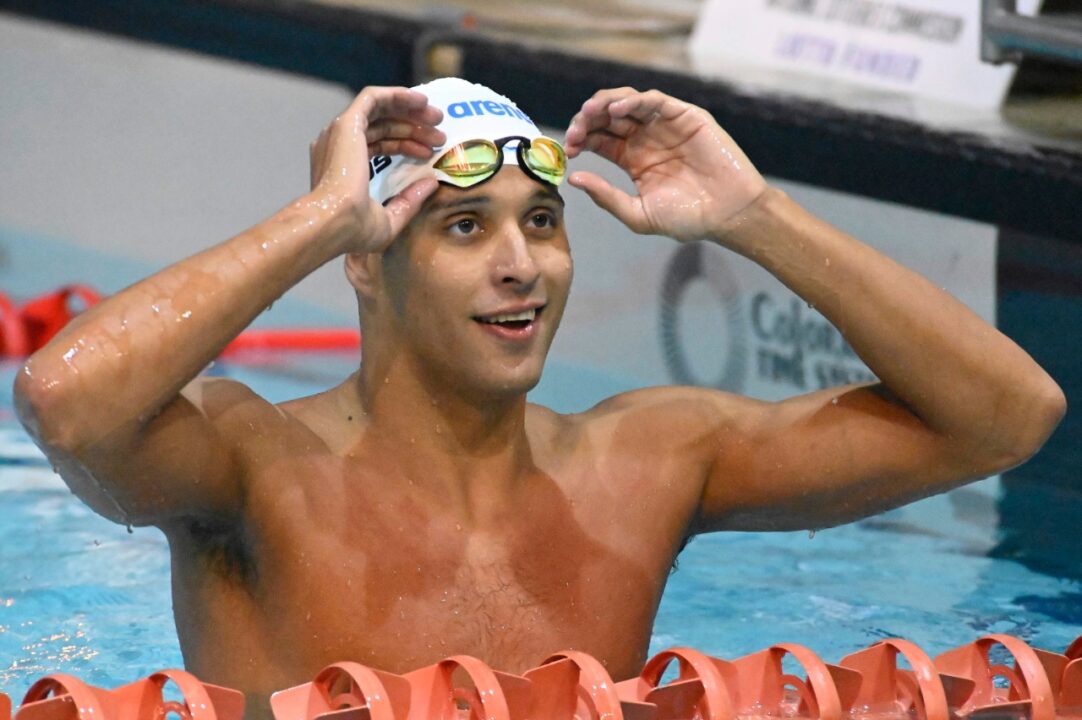South Africa’s Olympic champion Chad Le Clos introduced himself to the world in 2012 when he beat American icon Michael Phelps in the men’s 200 butterfly.
After his remarkable performance there in London, the Energy Standard athlete continued on the path of success, reaping 200 free and 100 fly silver in Rio in addition to multiple Long Course and Short Course World Championships medals.
At the 2020 Olympics last year, however, the now-30-year-old didn’t fare quite as well as he had in the past. He produced a time of 51.89 to finish 18th overall in the 100 fly while he logged 1:54.93 to place fifth in the 200 fly.
With another World Championships on the horizon this June in Budapest, Le Clos is reflecting on his Olympic career, specifically now just publicly addressing his bout with depression in Tokyo.
“It’s something I’ll never talk about because it’s not for anybody else to know. But it was something so deep, it was worse than my parents having cancer, and this was worse for them,” Le Clos told New Frame.
“I’ve always prided myself in being a head-strong guy, I’m the man, but I needed someone last year,” he said regarding his mental state during the world’s biggest sporting competition.
“I only started to speak to someone after the Olympics – biggest mistake of my life – and I started getting myself right again. I was in a dark place, even after the Olympics. I was super depressed.
“There were times where I was sitting in my room just crying by myself. I didn’t know why I was like that. It genuinely wasn’t about the Olympics. It was about my future and about me… it felt like I had fallen such a long way from where I was in terms of who I was as a person. It really wasn’t about swimming.”
Le Clos has since sought professional help, to which he attributes his ability to get to a better place in a year with both a World Championships and Commonwealth Games.
“I did some deep therapy last year. I’m okay to talk about it now because I’m actually good. I’m 100% good now compared to last year. Last year I couldn’t talk about anything because I was just a shell of myself.”
Le Clos is far from the only aquatic athlete to have made his mental health struggles known to others. The aforementioned Phelps is now a mental health advocate, helping dissipate the stigma that can sometimes be associated with depression and other difficulties.
More recently, multi-Olympic gold medalist Caeleb Dressel also came out about his mental health struggles, saying “I felt so lost. I wanted to get away from the water, but then that’s also one of my safe places. So it was, again, a rock and hard place. Yeah, it was a pretty miserable couple months.” (USA Today.)

An excellent take on post-Olympics mental care could be drawn by interviewing Le Clos, Phelps, Schmitt, Franklin, Keller, Shields, and a plethora of other depressive, medal-wearing Olympians, and detailing which modalities helped them best.
The biggest challenge would lie not in who is helped best, but in who gets the most money. This aspect would be likely to derail the writing project altogether (been there; done that).
If you look at Le Clos history this is disingenuous and an attempt to grab media attention.
What is your rationale? Depression in high-level athletes is pervasive, and not talked about much
Because he got in a bit of a back and forth with Phelps? That doesn’t preclude him from having depression
Stfu
Let’s see, Olympic gold medalist and national hero at the tail end of his career has depression. Where have I heard that before? Was it Thorpe, Phelps, C1 (relays), Seebohm (relays), Phelps, Biles? I’m glad he’s grabbing media attention. He’s not a robot. https://theconversation.com/when-you-get-home-its-really-lonely-new-research-shows-how-athletes-cope-with-post-olympic-life-163576
probably one of the worst takes on here
Thank you for your kind words
Maybe training mornings from the age of 12 and having almost no time off from the sport isn’t great for mental health
These stories are IMPORTANT. Thank you to the swimmers and all professional athletes of late who have been sharing their struggles; it helps the younger ones relate and realize they aren’t alone, and that it’s ok to seek help!
he could final in any event he entered and he’ll crush it Paris if he choses to go. He was definitely a legend in the 2010s